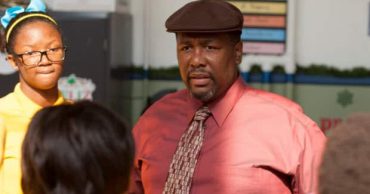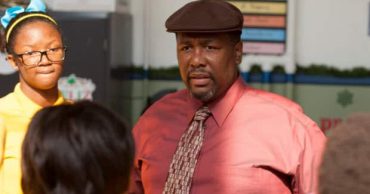
Never a show to rush into anything, I was hoping the truncated final season of Treme didn’t sacrifice its wonderfully meandering pace to adopt a more plot-heavy narrative style. “Dippermouth Blues” might be a relatively music-light episode of the show (save for the fantastic sequence in Ladonna’s bar near the end), but it doesn’t spend that extra screen time trying to raise the dramatic meter, a bit of a surprising move with the end hovering so near. Am I complaining? Absolutely not: although it’s another thoroughly dour episode, there’s still a lot of beauty to be found in the many characters of New Orleans, as a city and its people struggle to find hope and self-definition as everything seemingly crumbles around them.
There isn’t a lot of positivity to be found in “Dippermouth Blues” (something the title kind of gives away); the most explicit idea presented in the episode revolves around the corruption of New Orleans culture by the rest of the world, seen with Antoine and his journey into Hollywood. He’s met by a rookie actor who doesn’t know what a mouthpiece is, and has to teach him how to mime a difficult Kid Horry solo for the white-washed movie he was starring in. Unprepared and uninformed, we’re forced to watch all the excitement of teaching trombone sap out of Antoine’s face as he explains to the kid what Creole really means: it’s not a derogatory name, or some way to refer to a New Orleans black person: Creole is a culture, a community — nay, a family, one of Treme‘s thematic cornerstones. Be it our brothers and sisters or the third and fourth-generation families in New Orleans, family is the only thing we can count on when our world goes to hell.
Things get even more depressing while watching the inevitable fates of Terry and Albert play out before our eyes: Terry’s is a little easier to swallow, even as we watch a man rejected by his family willingly play rat to the feds, a group of people less interested in his honesty than burying everybody in the department alive. But of the two, Terry’s is more interesting to watch, steeped in the dirty, frat-boy police politics The Wire always loved to explore for hours at a time (time Treme would rightly rather spend watching performances or hanging in the streets of New Orleans) — though Albert’s quickly-declining health is obviously harrowing to watch, it follows a predictable plot thread that points out the already-established stakes for the Lambreaux family: will Albert be able to make the walk one last time?
As Treme often is, “Dippermouth Blues” doesn’t give much hope to the idea — like everything else in New Orleans, Albert is hanging on with all his might, even as everything is starting to fail around him. He’s still a prideful man, dancing to the sound of his son’s trumpet and falling asleep in front of his sewing kit trying to build his final Mardi Gras cloth. His cancerous body reflects the corrupt core of New Orleans politics: it’s weakened the host to the point where it can no longer stand on its own, relying on the love of family and friends to keep going, even when the end is vaguely clear on the horizon.
For the first time I can remember, “Dippermouth Blues” embeds more hopelessness than hope into its narrative: even as the inauguration of Barack Obama (“the first Creole president”, according to Davis) and the swell of hope that came with it swept across America, Treme finds a new level of bleakness to explore. Some of this is watching the rapid degeneration of Albert’s health, but it comes in many forms: the difficult choice Annie has to make, Janette losing her battle to save her name… it’s even something we can hear in the music of the episode: notice the heavy emphasis on the dark, ominous drums during the group’s practice in Ladonna’s bar. The trouble is always there: many types of evil threaten the ones we love, our livelihoods, our neighborhoods, our very way of life — only thing we can do is keep on singing to the beat, finding the beautiful harmonies around us that make the booming darkness underneath something to dance along with, rather than be afraid off. Like Terry says to the invisible hoodlums who damaged his car: “is that all you’ve got?”
Other thoughts/observations:
– Davis: “What the f***?!!! I can’t quit if it’s canceled!!!”
– Delmont and his lady (apologies, I can’t remember her name) drive through New Orleans, their music-infused drive interrupted by a hearse and a large, musical procession. The message is clear, and sets the tone for a very, very sad episode whenever Albert is around.
– A quick shot of trains cutting to Terry and his FBI contact talking reminded me very briefly of the Bunk/Jimmy meetings on The Wire… just a lot less drinking.
– Antoine has to give the actor tips, a lovely little nudge about his reluctance to reward cab drivers (he even shakes his head and mumbles “Tips…” at one point).
– The white band playing on-screen with the black man (Antoine) standing in the foreground off camera was a lovely little visual representation of New Orleans culture/musicians and how they were exploited by everything from record labels to movie studios. America!
– Although “Dippermouth Blues” rings in 2009 during the episode, there’s no falsities about hope or prosperity in the new year. Just “it’s 2009… we’re still f***ing here” from Janette.
[Photo via Paul Schiraldi/HBO]
 Follow Us
Follow Us

